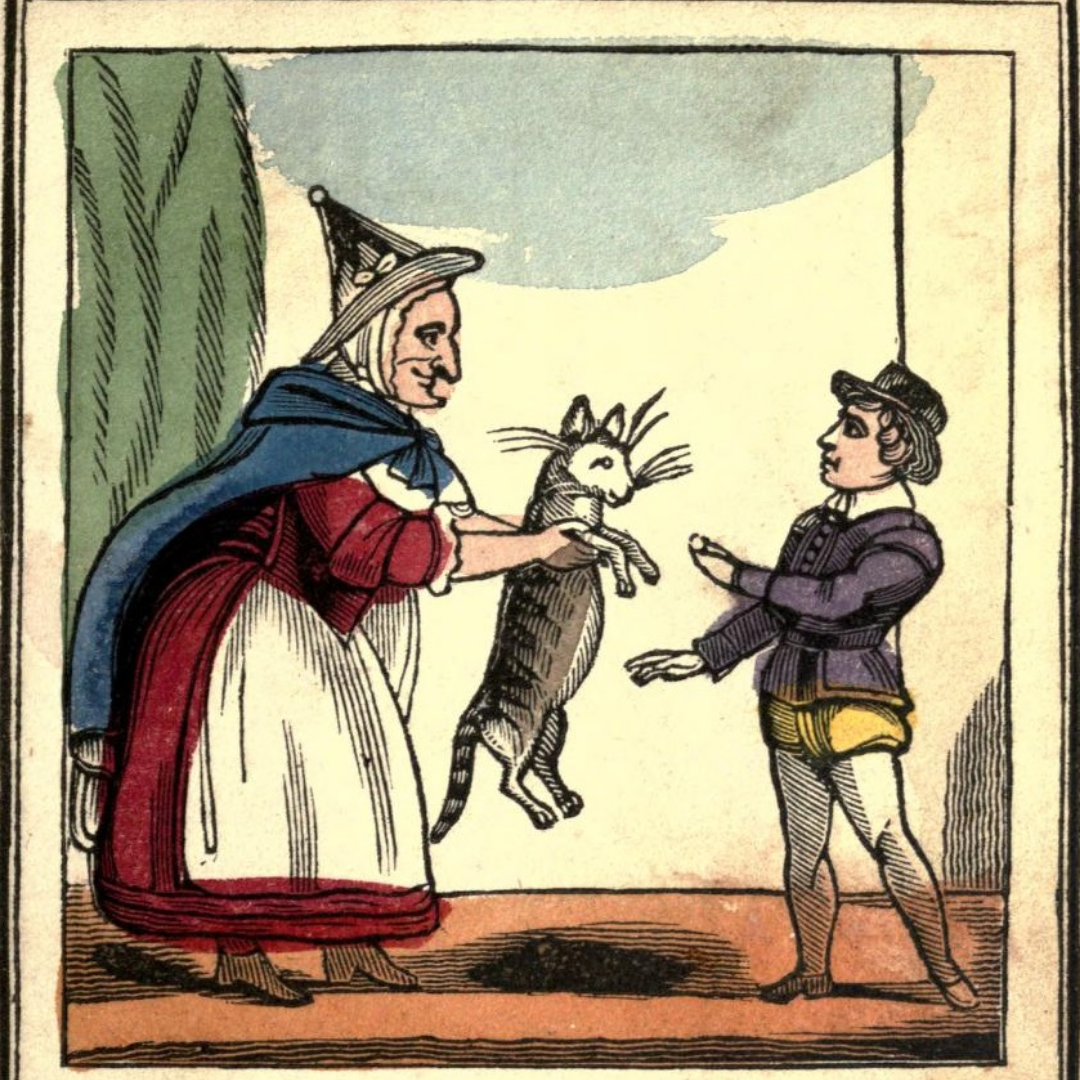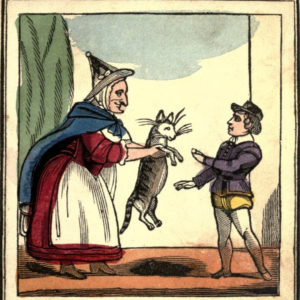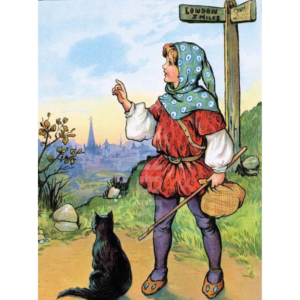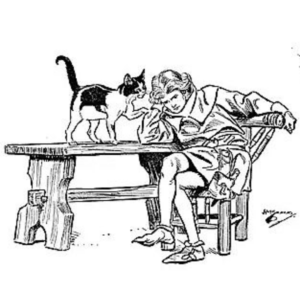Dick Whittington and his Cat


Dick Whittington and his Cat – Originally by Joseph Jacobs – Retold by Navin
This story is loosely based on the life of Richard Whittington, a mayor of London in 1397.
Once upon a time, in a poor village in England, there was a small boy called Dick  Whittington. His mother and father had died, and he was left poor and homeless. He was not yet old enough to work and was very badly off. The rest of the villagers were as poor as Dick; they had barely enough food for themselves, but they spared what bread crusts or potato peelings they could for the little boy. Dick had these for dinner, and mostly did not have breakfast. One day, Dick thought of London, the great city where the country people said the streets were paved with gold. The following morning, a big wagon drove through the village. Dick thought that the wagon would roll all the way to London, so he asked the driver if he could walk beside the wagon. The driver eyed Dick and his tattered clothes and decided to let the boy ride in the cart. When they reached London, Dick leapt out of the wagon and did not even thank the kind wagoner, such a hurry was he in to see the streets paved with gold. He kept running through the empty roads, hoping to finally reach the gold paved ones. Dick had seen a guinea (1/4 of an ounce of gold) three times in his village, and he thought if he took up 3 or four bits of the gold road, he would have all the money he needed. Dick ran till it was dark, and seeing nothing but stone and dirt streets everywhere, he sat in a corner and cried himself to sleep. In the morning, he woke up hungry, and asked people for charity. One gentleman gave him a ha’penny, but most ignored him. One angry man cried, “Go to work, you idle rogue!”
Whittington. His mother and father had died, and he was left poor and homeless. He was not yet old enough to work and was very badly off. The rest of the villagers were as poor as Dick; they had barely enough food for themselves, but they spared what bread crusts or potato peelings they could for the little boy. Dick had these for dinner, and mostly did not have breakfast. One day, Dick thought of London, the great city where the country people said the streets were paved with gold. The following morning, a big wagon drove through the village. Dick thought that the wagon would roll all the way to London, so he asked the driver if he could walk beside the wagon. The driver eyed Dick and his tattered clothes and decided to let the boy ride in the cart. When they reached London, Dick leapt out of the wagon and did not even thank the kind wagoner, such a hurry was he in to see the streets paved with gold. He kept running through the empty roads, hoping to finally reach the gold paved ones. Dick had seen a guinea (1/4 of an ounce of gold) three times in his village, and he thought if he took up 3 or four bits of the gold road, he would have all the money he needed. Dick ran till it was dark, and seeing nothing but stone and dirt streets everywhere, he sat in a corner and cried himself to sleep. In the morning, he woke up hungry, and asked people for charity. One gentleman gave him a ha’penny, but most ignored him. One angry man cried, “Go to work, you idle rogue!”
 “I would sir, if you would but hire me,” said Dick, but the man cursed at him and went on his way. A kindly gentleman hired Dick to make hay at his field, but once the harvest was over, Dick was no better off than in the beginning. He eventually wandered to a random house and collapsed on the stairs. The evil-tempered cook beat him and tried to chase him away, but at that moment, the wealthy merchant who owned the house, Mr. Fitzwarren, came home to dinner.
“I would sir, if you would but hire me,” said Dick, but the man cursed at him and went on his way. A kindly gentleman hired Dick to make hay at his field, but once the harvest was over, Dick was no better off than in the beginning. He eventually wandered to a random house and collapsed on the stairs. The evil-tempered cook beat him and tried to chase him away, but at that moment, the wealthy merchant who owned the house, Mr. Fitzwarren, came home to dinner.
“Why do you lie there my boy? Come, let us go in to supper,” he said. The man took Dick inside, and once he was fed, he was made a bed in the attic, and given work there as the cook’s assistant. He worked hard at every task he was given, but was dreadfully troubled by the other workers, who were cruel to the poor boy. Only Alice, Mr. Fitzwarren’s daughter, was kind to him always. When she came to see the trouble Dick faced, she insisted that the servants stop, or be sent away. Dick did not suffer any more but was kept awake at night by the rats that were in the attic.
He saved up every penny he earned and bought for himself a cat, the finest mouse-catcher in England, and one who was quick and intelligent. Dick kept the cat with him in his garret. It was a comfort and a friend to him, and he soon grew very fond of it. Mr. Fitzwarren soon announced that he would be traveling to Africa for a trading venture. He asked all the house servants to give him something that they owned so he could sell it for them. Dick did not  have a thing to sell and sat in his attic, feeling sad and ashamed. Mr. Fitzwarren told him that he could sell his cat, and Dick gave it up with tears in his eyes.
have a thing to sell and sat in his attic, feeling sad and ashamed. Mr. Fitzwarren told him that he could sell his cat, and Dick gave it up with tears in his eyes.
A few weeks later, the merchant ship arrived in a Moor settlement in Africa. The sailors were warmly welcomed by their king and queen, and all the Moors and sailors sat talking merrily in a dining hall. Suddenly, the doors opened, and a hundred rats flooded the room, eating every bit of food. The astonished Mr. Fitzwarren asked the king if this happened often. The king said that it did, and that he would give up half his fortune for a cure. Mr. Fitzwarren, brought in Dick’s cat, and the king, when informed that it would get rid of the rats, and that its kittens would be enough to stock the whole country, paid at once half his fortune with gladness. Mr. Fitzwarren returned to England with the fortune. All the men told him that it was too much money for little Dick, and that he should keep it. Mr. Fitzwarren said, “He shall have the entire sum, and I shall not take a single farthing,” though the fortune was more than what he himself had. When little Dick received his treasure, he shouted with joy and begged Mr. Fitzwarren to take what portion of it he pleased, but the kind merchant shook his head and smiled to see the orphan happy. After Dick was washed, had his hair combed, and was made a fine suit, he looked a handsome young man. Alice thought him a wonderful gentleman, and Dick, remembering her past kindnesses, became her sweetheart. With Mr. Fitzwarren’s blessing, the two were married. In time, Dick became the Lord Mayor of London, and lived happily ever after, as did his cat! 🐈








